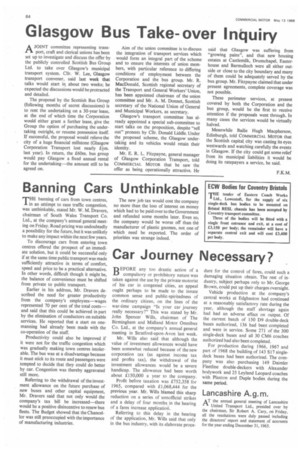Banning Cars
Page 66

If you've noticed an error in this article please click here to report it so we can fix it.
THE banning of cars from town centres, in an attempt to ease traffic congestion, was unthinkable, stated Mr. W. M. Dravers, chairman of South Wales Transport Co. Ltd., at the company's annual general meeting on Friday. Road pricing was undoubtedly a possibility for the future, but it was unlikely to make any impact within the next few years.
To discourage cars from entering town centres offered the prospect of an immediate solution, but it could be successful only if at the same time public transport was made sufficiently attractive in terms of comfort, speed and price to be a practical alternative. In other words, difficult though it might be, the balance of convenience must be shifted from private to public transport.
Earlier in his address, Mr. Dravers described the need for greater productivity from the company's employees—wages represented 70 per cent of the total costs— and said that this could be achieved in part by the elimination of conductors on suitable services. He reported that a start on onemanning had already been made with the co-operation of the staff.
Productivity could also be improved if it were not for the traffic congestion which was gradually making town centres intolerable. The bus was at a disadvantage because it must stick to its route and passengers were tempted to decide that they could do better by car. Congestion was thereby aggravated still more.
Referring to the withdrawal of the investment allowance on the future purchase of new buses and other capital equipment, Mr. Dravers said that not only would the company's tax bill be increased—there would be a positive disincentive to renew bus fleets. The Budget showed that the Chancellor was still preoccupied with the importance of manufacturing industries.




















































































































































